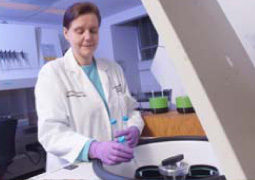Keeping T cells young

Cornelia Weyand
Patients with rheumatoid arthritis have T cells that are prematurely aged, Emory researchers have found.
Reversing this defect could lead to new therapies for the disease.
The T cells’ chromosomes are depleted of telomeres, which cap the ends of the chromosomes and grow shorter each time cells divide unless a specialized enzyme replenishes them. Telomeres are believed to be important for healthy aging and cancer prevention. T cells from patients with rheumatoid arthritis have trouble turning on the enzyme that replenishes telomeres, researchers reported recently.
The enzyme, telomerase, helps prevents loss of genetic information after cell division. Telomerase is active during embryonic development but usually switches off in adult cells. Some cancer cells reactivate it to enable rapid growth. Also, T cells can turn on the enzyme.
T cells in patients with rheumatoid arthritis make 40% less telomerase, says Cornelia Weyand, co-director of the Lowance Center for Human Immunology at Emory. Transferring telomerase into patients’ T cells prevented the cells’ death, and doing so could possibly “reset” their immune system.
While the telomerase finding is promising, Weyand says, turning the enzyme on indiscriminately could lead to cancer. Treatments would need to target the right cells, she says.


